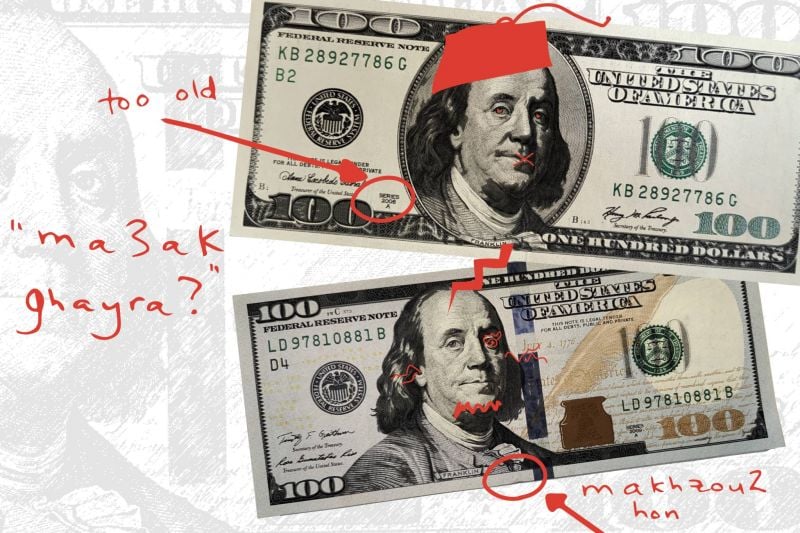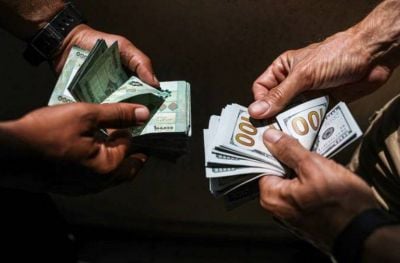
Illustration by Jaimee Lee Haddad
BEIRUT — "Maak ghayra?" Do you have another one?
It is a question heard by every person living in Lebanon whenever they try to pay or exchange damaged, torn, ripped, old or stained US dollar bills – despite the unripped ones being legal tender. Still, most businesses and exchange stores reject such notes.
Starting in 2013, the US introduced a new $100 bill, informally known as the "blue dollar" in the Lebanese market. Blue dollars feature a blue 3D ribbon woven into the center of the note. This strip is absent in older $100 notes, which are referred to as "white dollars."
In December 2021, in response to Lebanese businesses' growing refusal to accept white dollars, the US Embassy in Lebanon told L'Orient Today that “it is US government policy that all designs of Federal Reserve notes remain legal tender, or legally valid for payments, regardless of when they were issued. This policy includes all denominations of Federal Reserve notes, from 1914 to present.”
What are the positions of Lebanese money changers, banks and shops regarding this issue?
'The banks are refusing these bills!'
Contacted by L'Orient Today, the head of the money changers' syndicate in North Lebanon, Majd Masri, said that banks are mainly to blame for the refusal of shabby notes and old $100 bills in the market.
"If a bill's condition is slightly bad, the bank does not take it," he said.
Masri told L'Orient Today that by not accepting a bill, the bank creates a cycle: "If the bank does not accept these low-quality notes, I will automatically not accept them from clients. If the [money] exchanger does not take them from a commercial shop, the latter will further scrutinize the notes."
He added that if banks were to accept all notes, then money changers would not mind taking older or slightly damaged dollar notes.
Asked about the reason behind the banks' high scrutiny of dollar bills, he said that this might be linked to the period when Lebanon was facing a lack of liquidity as part of an economic crisis that started in 2019 and money was circulating within Lebanon more than getting out of the country.
"If a bank would take money from a client, it would need to pay it to another client who would not accept [damaged] bills," so the bank would rather not take the risk, Masri explained.
While admitting that the liquidity situation has changed for the better today, Masri did not explain why banks are still carefully examining dollar bills.
L'Orient Today visited a "Bonjour"roadside convenience store in Hazmieh and asked an employee whether they accept dollar notes in poor condition.
He said that the store rejects them. "The bank is returning such bills and we find ourselves unable to exchange them," he explained.
Banque Du Liban (BDL) did not immediately respond to L’Orient Today’s request for comment.
Commission on damaged dollar bills
When banks refuse to accept damaged notes, the only option money changers have is to send them abroad through money-shipping companies or with a person traveling overseas.
Some exchangers accept damaged notes only if the client pays one or two dollars extra.
"When we give money-shipping companies dilapidated dollars, there is a cost of shipment as companies take a certain amount per bill," Masri explained.
He added that some exchangers do not accept these dollars due to the aforementioned costs.
L'Orient Today asked Masri why some money changers take notes in bad condition but ask for $1 to $2 extra to do so, while others don’t accept such notes at all.
"Those who accept them and ask for more have a way to ship them out of the country through a money-shipping company or through collecting the bills and then giving them to someone who is traveling so that he can exchange them outside Lebanon," he answered, "so when they ask for $1-2 extra, they take the commission of the shipment or the cost of travel."
"The money changer who doesn’t have these opportunities decides not to take these dollars," he added.
On a rainy afternoon, L’Orient Today visited a money exchange shop in Furn al-Shubbak to ask the money changer whether he accepts damaged dollars. He pointed to a stack of bad-quality bills that had been separated from the good ones.
He said that he accepts all bills unless they appear to be forged. However, he admitted that he asks for one or two more dollars from the client if the bill is in bad condition, for the same reasons that Masri mentioned.
Local money shipping company, Mecattaf, was not immediately available for comment.
'What does this have to do with banks?'
The director of Byblos Bank's research department, Nassib Ghobril, laughed when he heard the aforementioned accusations against banks. He said that there is a tendency in Lebanon to blame banks for anything.
Ghobril said that "traders do not deal with banks" as Lebanon's economy is currently a cash economy, which means that financial transactions are carried out in cash rather than by using credit cards or other means. This fact, in his opinion, is enough to debunk the accusations that banks are not accepting some dollar bills.
Cash has been the primary mechanism of payment in Lebanon since the onset of the financial crisis in 2019, when banks began imposing informal, ad hoc restrictions on depositors' access to their dollar accounts.
The World Bank estimated the cash economy in Lebanon amounted to $10 billion in 2023, or roughly half of the country's GDP. By the end of 2022, the country had already lost a quarter of its ATMs and more than a fifth of its bank cards in circulation, pending figures for the whole of 2023, according to BDL.
"Traders do not deal with banks; transactions take place from trader to trader, shop to shop, businessman to businessman. What does this have to do with banks?" Ghobril said.
"They are not even putting their money in the banks for banks to accept or refuse these dollar bills; [these accusations] are funny," he added.
"It's in their interest to make" such accusations, Ghobril said, without explaining further.
Asked about whether banks are currently accepting old or "white" $100 bills, Ghobril said he wasn’t sure.
Although Masri admitted that people were not dealing with banks when the crisis was at its worst, he said that people are now "putting money in banks again and doing their transfers through banks."
He also said that banks were not taking these dollars even before people temporarily stopped dealing with banks as a result of the crisis.
Never-ending cycle
Even supermarkets do not accept damaged or old dollars, according to the president of the union of supermarket owners, Nabil Fahed.
Fahed told L'Orient Today that two main reasons can explain the supermarkets' decision to refuse notes. First, suppliers would not accept bills in bad condition from supermarkets and, second, exchange stores would charge the supermarkets a "high amount" to accept and exchange marred notes.
"This problem is present everywhere in the market because it is a cycle," he said.
